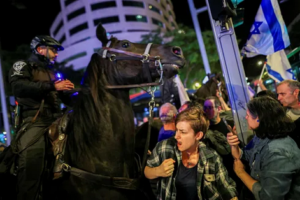For many, the democracy Israelis fear losing never existed in the first place

An Israeli policeman on horseback forcibly disperses an anti-government protest in Tel Aviv, April 2025
Noa Limone writes in Haaretz on 12 May 2025:
Imagine the following scenario: An Israeli teenager who loves gaming plays online with people his age from around the world, including a boy from Egypt and a girl from Gaza.
The Shin Bet security agency, which monitors Israelis’ online activities, calls him in for questioning. Agents strip him, conduct a body search and interrogate him for hours, presenting him with all the content he has viewed on the internet, as well as certain songs he listened to.
This is not a thought experiment meant to impress upon readers what might happen to them and their children if the next head of the Shin Bet is loyal to Prime Minister Benjamin Netanyahu. This story is neither fictional nor futuristic. This story has already happened.
An investigation by Haaretz’s Eden Solomon, published on Sunday in the Hebrew edition, details just such a case, that along with many others shows the reality faced by Israel’s Arab citizens in general and the Bedouin community in particular: the secret police’s ongoing involvement in their private lives, the censorship of freedom of expression on social media and a constant threat that if they express any thought that could be interpreted as criticism of the state, or even compassion for residents of the Gaza Strip, they will be taken in for questioning.
According to the testimonies in the article, such practices have intensified in recent years, particularly since the October 7 massacre, but they are not new. It’s been like this for years. As a Bedouin Israeli, you can disappear into a humiliating and frightening Shin Bet interrogation, sometimes without legal representation, no matter if you’re a high school student or a grandmother.
This is the democracy that we set out to protect, armed with the Israeli flag. This is how it behaves toward those who aren’t Jewish.
Many Israelis’ real and justified fear over the government coup reflects the understanding that life in a dictatorship is not life. And many people’s support for Shin Bet Director Ronen Bar expresses the (correct) understanding that if he were replaced by a Netanyahu loyalist, the lives of Israel’s Jewish citizens could come to resemble those of its Arab citizens and, in some respects, even those of the Palestinians living in the West Bank.
This is also true for the public’s defense of the High Court of Justice, which for years has legitimized the occupation in the territories and permitted the detention of minors without trial, and of Attorney General Gali Baharav-Miara, who has become a symbol of the defense of individual rights – indicating both the abyss into which the current government has led us and the complete indifference of most Jewish citizens of the state to the rights of non-Jews.
The fear of becoming citizens of a nondemocratic state leads hundreds of thousands of people here to take to the streets or to emigrate. Still, it completely misses the fact that, in any event, Israel is not democratic. The fact that the first paragraph of this text describes a Bedouin boy and not a Jewish one shouldn’t matter, but it does.
The common criticism regarding such stories is, “In the end, it will reach us, too.” That is, the same method might be applied to other, more privileged groups, such as “leftists” or “opponents of Bibi.” But “in the end, it will reach us” is a complete internalization of the idea of Jewish supremacy. Instead of “us” comprising everyone, including the Bedouin, it becomes an ethnocentric marker that exemplifies the antidemocratic distortion.
The truth is that as soon as it happened to the Bedouin, to the Palestinians, to other weak minorities, it has already reached us.
This article is reproduced in its entirety
